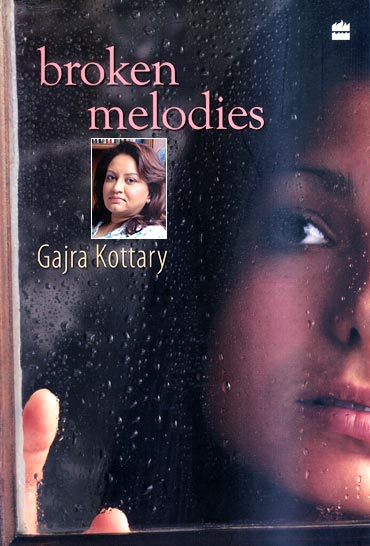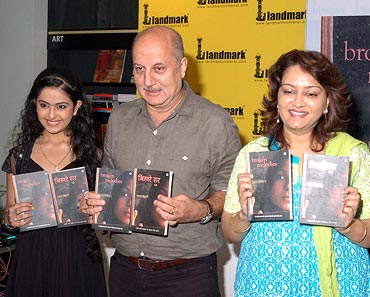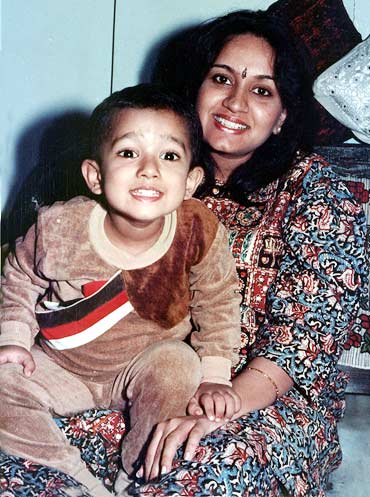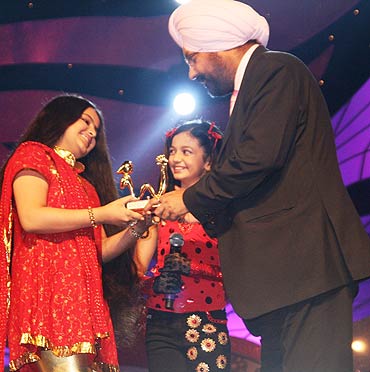 | « Back to article | Print this article |
Balika Vadhu writer on how to get a break in TV
Want to know the real reason why you are riveted to the television set every night? Or groan at the sight of your girlfriend, mother or sister, especially when you want to catch up with the IPL?
Meet Gajra Kottary, one of India's most successful television scriptwriters. The former freelance journalist has popular serials like Balika Vadhu, Jyoti, Godh Bharaai and Astitva to her credit. Along with her colleagues, she has won the Apsara award for Best Scriptwriter.
She has also just written her first book, Broken Melodies, which like her serials, peopled women of strong character.
She shares the secrets you need to know to become a successful scriptwriter for television.
Excerpts from an interview with Savera R Someshwar.
What kind of a mindset does it take to become a scriptwriter? If you could share some tips, what would you suggest?
The most important thing is to not take yourself too seriously. We are so caught up in what we create. It's possible that you've created something nice, but there's always scope for improvement. There's always scope for adaptability and flexibility. Temperamentally, one has to be extremely flexible.
People can't take criticism very well. They have talent but just having the talent is not enough. You need a lot of staying power, especially in television. The best of people run out of steam.
A serial gets more and more challenging because there is so much you can't repeat; you've either already done it or others have done it and you want to be different. Nobody wants to see the same story or the same situations all the time.
To keep yourself charged under such circumstances takes a lot of discipline.
There's also the give and take with other team members. You could have written something fantastic but your senior may think it's not so good or it does not go with where we are heading or it cannot be used for whatever reason Instead of getting demoralised and upset, you have got to say okay, now what best can I think of?
Believe me, many a time, what emerges at the second stage is better than what happened at the first. It's just that you've got to bring yourself to do it and not give up.
The television business is very complex. We have so many artistes who are working for us round the clock that there are human situations. Somebody could be sick, somebody may want to go on leave, etc. You have to be able to deal with that.
Then there is expense -- television serials are expensive to make and there are certain dos and don'ts which happen in terms of rules. You don't want to show a person drinking or smoking. It may go with the character but you can't show it on television.
But if you look at the limitations as challenges, then I think it's quite a fun place to be in.
At the same time, do remember it's a lot of hard work. You just have to prepare yourself for the long haul.
'When you are making episodes, you have to balance the various tracks'
How much time do you invest once you start writing?
When I was doing screenplays, there was much more of actual hard work. It's not just conceiving the story but actually writing the scenes.
Now, with the pressure of dailies, that too five times a week on air, we have departmentalised our work. We have people doing stories, people doing the screenplay and people doing dialogues.
At every stage, there is enhancement; at every stage, there is a little bit of adaptation and modification.
A lot depends on how fast you are, to put it very crudely.
When you are experienced and you make a habit of thinking on your feet, then it's possible for a scriptwriter to do two shows. Two, I think, is optimum; it's like a full-time job.
When I say two shows, I mean story only, not screenplay. Otherwise, attempting an eight or 10-page screenplay is quite a bit for a day.
Let's take one of the earlier episodes of Balika Vadhu, say the clash that developed between the husband and wife, Jagya and Anandi. What would your contribution be to that part of the serial?
When you are involved with the story of the show, you cannot think episodically.
It's like a constant roll. You are thinking of a larger story arc -- what do I want these two people to do, what am I trying to say? What is the track? For example, we'd first decide if it was a Basant-Gehna (other characters in Balika Vadhu) track or is it a Basant-Gehna conflict track? At what point do we want to begin, what do we want to explore and where do we want to culminate?
And culminate may not mean end, it may mean pause for the moment because it's not the main track.
So, at one level, your mind is working towards the larger story arc. At another level, if it is a sub-track for example, you have to first write in detail how you see the story developing over the next few months before you get into finer points.
When you are making episodes, you have to balance the various tracks. You have to decide how much you will move with one sub-track because you know where you are moving the main track.
It's like being a weaver (smiles).
'The best way to learn is to assist someone who is already doing the job'
Do scriptwriters for television earn well?
Yes, now they do.
How does one become a scriptwriter?
I believe there are places which actually teach scriptwriting. I've heard, for example, that Balaji and a couple of companies have gotten into it.
Personally, though, I feel the best way to learn is to assist someone who is already doing the job. There is no better experience than actually assisting someone who's been there, done that. As a result, you will be completely involved. After a few days, you will see what you have written onscreen. You can see how your vision has translated onscreen and you can work at improving your writing.
Luckily, television offers innumerable chances so you can always go back and improve.
When you see that a track is working well, you can improvise and create a beautiful story there.
As a scriptwriter, you have written a lot of serials. But Balika Vadhu has been by far the most successful. What did it feel like to create a serial that opened to so much angst and went onto to create such unforgettable characters?
It's not originally my story. The concept and story came from my senior colleague Purnendu Shekhar. He's from Rajasthan so he brought in the entire authenticity and everything that is so typical of that culture.
We have been working together since Astiva.
I've been involved from Day One with Balika. While the concept itself is very interesting, I really don't think it's the concept alone which has been able to last successfully for 700 episodes.
Each character in Balika is an author-backed character; so much so that you can give me a situation and I can tell you how any character in Balika will react to it.
It's not a fluke that a serial on child marriage has managed to do so well in the cities which have virtually nothing to do with child marriage.
The planning and waiting stage before Balika went on air was actually quite a bit; for a couple of months, we looked and relooked into whatever we were creating. Apart from the conceptualisation and the story itself, the situations we have created are immensely realistic and not just to do with child marriage.
We have taken a universal approach to inter-personal relationships. They will find resonance in the most unlikely of characters -- the middle class city couple sitting and watching will say, Oh my God, my daughter could have been in this situation. Oh gosh! How would I feel as a mother if this were what my son did...
In terms of the social issues also, there has been a lot that is universal -- the fact that in every home there is either a matriarch or a patriarch. There are a lot of stifled emotions that age-old generation gap battle.
What's nice, I think, is that there are no blacks or whites in Balika; it's all shades of grey, every character, which is what we see around us.
'Talent is not always equal to success'
Any tips on dealing with success?
I had heard a lot of bad things about successful people. But let me tell you, when I actually started interacting with them, there was a lot to learn.
Talent is not always equal to success; in today's complex world, you need to have things other than talent.
You need to be a pleasant person. You need to be a person people want to deal with and talk to. You may sing brilliantly, you may write brilliantly, but if people don't want to deal with you, what are you going to do?
You are not superior in any way because you are a creative person; creativity does not put you on any pedestal.
I have seen the best of creative people and they are very humble, very down-to-earth.
It takes me back to what I said at the beginning, we shouldn't take ourselves too seriously.
There is a lot of criticism about how television scriptwriters write for TRPs.
Television is a very responsive, very expensive medium, so you have to maintain a balance between what people like to see, what they want to see and what we want to show them, what we want to say when we show them something.
Television is a medium that involves a lot of people, so scriptwriters do interact a lot with their team.
Since you are a writer who needs to draw on life experiences as well as your imagination, do you see yourself looking at every experience differently?
(Smiles) Yes, that does happen at some level.
Has anyone caught you doing that?
My kids have, many a time.
How do they react?
Now it's been so many years, they've stopped reacting.
My son has a fantastic sense of humour. He is the kind of guy who will crack a funny joke in the middle of a fight. It's a huge advantage for him; you start laughing in the middle of a fight.
Then he says, when am I going to see this situation in Balika?
Sometimes, it's overly dramatised also. If my son had just been talking about ragging for example, or you read something in the paper it's becomes the initial trigger. The rest has to be blended with the situation.
How has your personal life impacted your work?
The impact's been very positive. When you get to play so many roles, your understanding of human beings, of situations, of conflicts of different age groups and how they think, what makes them tick -- all that becomes all that much more rich.
When you have so many experiences, so many aspects of relationships to deal with, it just betters your understanding of human situations.
When I am writing something for Balika and I am faced with a father-son conflict, my mind does draw parallels with a father-son conflict that happened in my house and how I was torn between the father and the son or how my son was thinking or how my husband was dealing with him.
If I did not have this plethora of experiences, it would not have made me varied in my experiences. You learn to be so much more accepting of differences when you have four different or five different age groups at home to deal with. You have to keep the balance.
You just have to force yourself to say, okay, my 17-year-old girl is thinking like this. I don't understand because this is not how I thought but this is how she is thinking so I accept it. Since I love her, I accept it a little more. I force myself to understand and empathise with her.
It really contributes very positively in terms of understanding human characters, conflicts, dilemmas and emotions.



